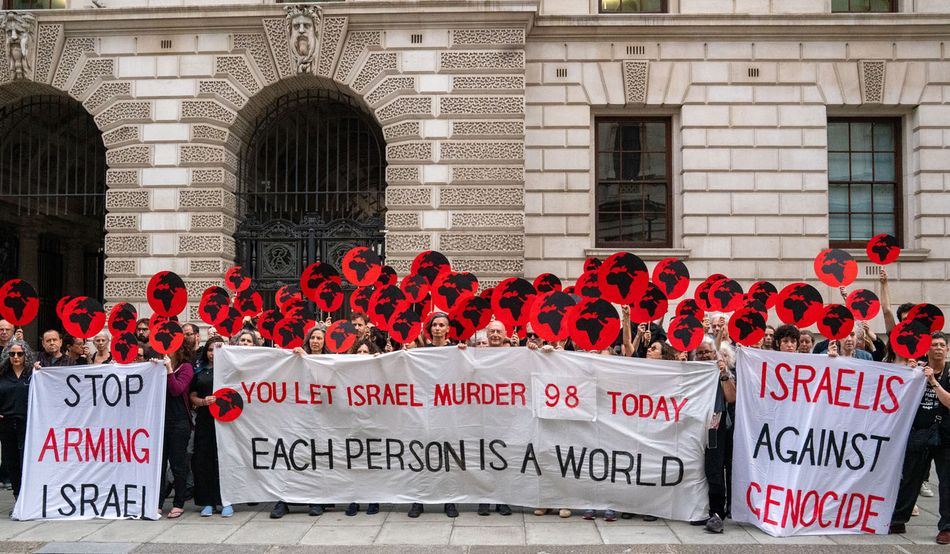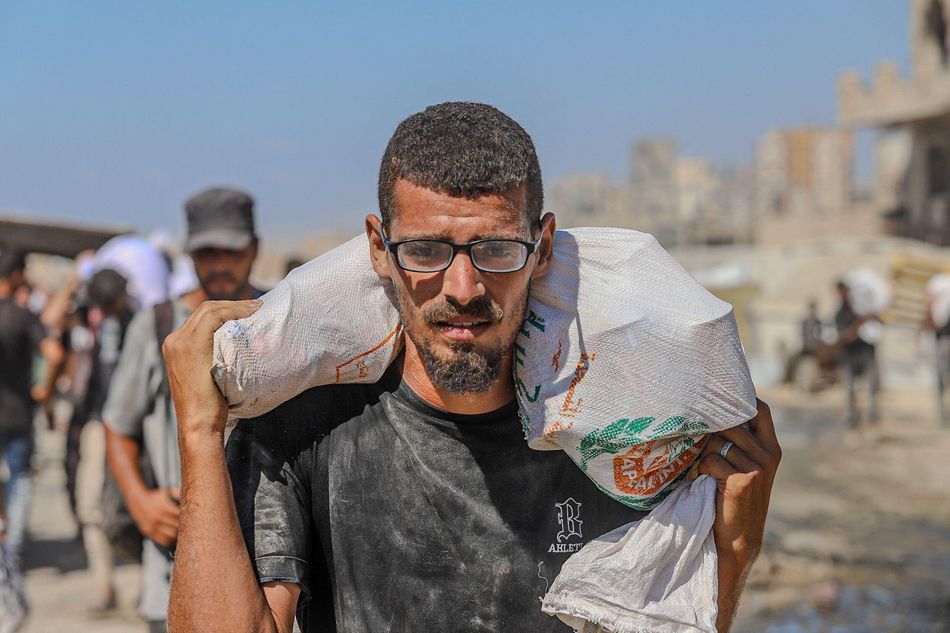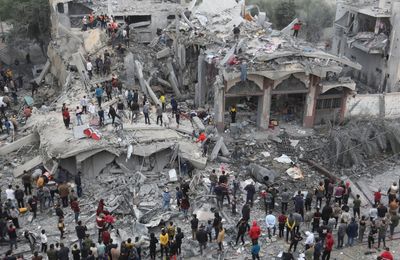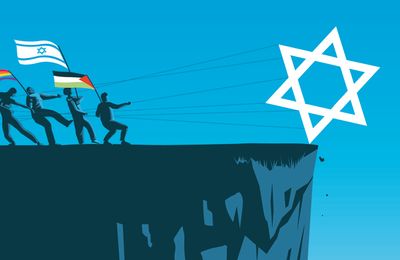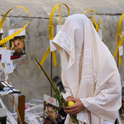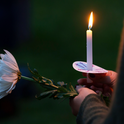On the day that Israel’s security cabinet met to vote on Benjamin Netanyahu’s plan to take control of Gaza City, more than 100 people gathered outside the Foreign Office in London, each holding up a flat, round, red and black globe. The protest comprised mostly Israelis and British Jews and had been organised by a new activist group called Mi Neged, which is Hebrew for “in opposition”. They were there to urge Keir Starmer’s government to take actual action—“sanctions now, stop arming Israel now, send aid now”—to stop what experts increasingly agree is a genocidal campaign, carried out by Israel in Gaza.
Each globe symbolised one of the Palestinians killed that day, among the more than 60,000 killed in this war. This idea was derived from the Talmudic tractate, Sanhedrin, which teaches that to kill a person is to have “caused a whole world to perish”, while to save “a single soul” is equivalent to saving “the whole world”.
Mi Neged is just one expression of the swelling of shame and of guilt among the Israelis and Jews who feel complicit in the atrocities unfolding in the Strip and long for this to stop. Two Israeli rights organisations, B’Tselem and Physicians for Human Rights Israel, have been gathering testimonies and evidence since the war started on 7th October. On 28th July, for the first time, they said that what is happening amounts to genocide. “Nothing prepares you for the realisation that you are part of a society committing genocide,” B’Tselem executive director Yuli Novak said when the report was released. “This is a deeply painful moment for us.” This month, the Israeli author David Grossman told an Italian newspaper that “with immense pain and with a broken heart”, he had come to understand what is happening as a genocide. Some had warned very early on about the war’s genocidal nature, or at least the potential for it to turn out to be so.
Even among those who would still baulk at the use of that term, there has been a major shift. Amid the death from starvation of dozens of Palestinians in recent weeks, even the Board of Deputies of British Jews, the representative body that has staunchly supported Israel’s government throughout the war, released a statement condemning “the appalling rhetoric and unacceptable proposals from some Israeli ministers, particularly in relation to the forced displacement of Gazans, as well as the intolerable violence perpetrated by extremist settlers in the West Bank”. Going further than the Board, in a newsletter on 3rd August, Jeremy Ben-Ami, head of the US liberal Zionist group J Street, explained how he has been persuaded “rationally by legal and scholarly arguments” that Israel will one day be found to have violated the genocide convention in Gaza. And though he would be unlikely to use the term itself, because of his “association of the word genocide exclusively with” the Holocaust, “I cannot and will not argue any more against those using the term. I simply won’t defend the indefensible.”
Such shifts happen slowly, then all at once. Such as when, on 25th July, more than 221 MPs from various parties signed a letter urging Keir Starmer to recognise a Palestinian state. Five days later, Starmer announced recognition in September, unless Israel meets certain conditions that it will never meet. It’s just not enough, as the activists with the globes pointed out outside the Foreign Office. “Starmer’s ‘threat’ that the UK will recognise Palestine has unsurprisingly had no effect” on Israel, the group said in a press release.
Netanyahu’s plan to enter Gaza City was approved early on Friday morning, despite opposition from the IDF chief of staff, mass protests and warnings that this escalation of the war will kill the remaining Israeli hostages and many more Palestinians. The plan includes “five principles for ending the war”, one of which is to achieve “Israeli security control” of the Strip. How many more people will have been killed by the autumn, when the UK will recognise a Palestinian state? On Thursday, the UN said that, in July, of a sample of 136,000 children under five in Gaza, 12,000 are malnourished. Of those, an estimated 2,562 are severely malnourished.
And what will be left in September of Gaza, where already around 92 per cent of residential buildings are estimated to have been destroyed? Though the plan which the security cabinet voted on focussed on Gaza City, on Thursday, Netanyahu had told Fox News he intended a full takeover of the Strip. According to the UN, Israel already controls more than 80 per cent of the territory. On 31st July, ultra-nationalist Israelis who hope to re-establish Jewish settlements in Gaza marched close to the border of the Strip. Among them was a minister from Netanyahu’s Likud party, Shlomo Karhi. He posted a video to social media, where he said: “We want all of the Gaza Strip… Now our soldiers are there, conquering the territory, and Jewish settlement is a must. That’s the reality.”
That is not what all Israelis want. On Thursday, the desperate families of Gaza hostages launched a flotilla from the southern town of Ashkelon to the Gaza border, demanding a hostage release deal and opposing Netanyahu’s plan to reoccupy the Strip. That evening, Israelis were protesting in towns and cities across the country. But after decades of conflict, the dehumanisation of Palestinians runs deep in Israeli society.
For many Israelis, despite Netanyahu’s forever wars—in Gaza, with Iran, with Hezbollah, under fire from Houthi rockets—life has broadly continued as normal while Palestinians starve, are bombed and shot. Many Israelis, consuming media which until very recently (with notable exceptions, such as the Haaretz newspaper) barely reported on what their war had done to Palestinians, have looked away from or are in denial about the atrocities enacted in their name.
After nearly two years of this war, the death toll have fast climbed to utter disproportion, the ostensible aims of defeating Hamas and releasing the hostages obviously not at the centre of any military strategy, much of the country still sees itself as liberal, western, a democracy. These Israelis want more than anything for their country not to be an international pariah. Many Israelis don’t want to believe that the messianic extremism of those longing to resettle Gaza is a part of their country that reflects on them. There’s some leverage for Starmer’s government, as the academic Yair Wallach, a founder of Mi Neged, has argued.
Outside the Foreign Office, the activists held up a banner saying: “You let Israel murder 98 today. Each person is a world.” Their point was that these numbers pass us by, abstract figures in the news. People don’t stop to think of the fact that every number was a human being, with all the hope and fear and feeling, all the love, curiosity and imagination that that entails. Because surely, if they did, governments like ours would have done everything in their power to have stopped this war by now.
This article has been corrected to clarify that the figure of 12,000 malnourished children is only from a sample of 136,000 children under five who were screened in the month of July. The total number of malnourished children in Gaza will be higher.
